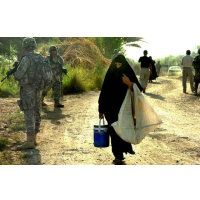U.S. Invasion of Iraq was Death Knell for Women’s Rights
 (photo: U.S. Army)
(photo: U.S. Army)
Life in Iraq for women since the U.S. invasion in 2003 has become worse from the standpoint of political rights, according to a new media survey.
The Thomson Reuters Foundation asked 336 gender experts about women’s rights in the Arab world, and Iraq came in second to last (21st out of 22 states).
Iraqi women now face higher rates of domestic abuse, prostitution and illiteracy, the survey found. Furthermore, thousands of women have been left widowed by the war and insurgency that followed.
Many women have come to hate the political leaders that followed Hussein and the growth of social conservatism that has mitigated their role in public life.
“If the 2003 war had not taken place...at least my husband would be still alive and I would not live in such humiliating circumstances,” Ibtisam, a 40-year-old Iraqi woman, told Reuters. While fleeing the U.S. invasion, she was injured by an iron bar and had to have her uterus surgically removed. Her husband was subsequently kidnapped and murdered by a Shi'ite militia.
Sana Majeed spoke of an incident back in 2005, when a group of men in black confronted her on the street for wearing inappropriate clothing and not covering her hair.
“Islamist parties started to control Iraq and that was the worst nightmare Iraqi women have ever faced,” Majeed, who now wears a black abaya and head scarf, told Reuters. “Religious parties and militia have stolen free life from Iraqi women.”
She now reminisces about better times when she could dress as she wished and attend any social function she wanted to. It was a time when women’s rights—pertaining to such areas as inheritance, child custody, marriage and polygamy—were protected by a “personal status” law, viewed as the most progressive in the Middle East. Once the new government was installed following the U.S. occupation, it was the first piece of existing legislation that the new regime eradicated.
Journalist Rania Khalek wrote earlier this year about how the toppling of Hussein was not good for women.
“Contrary to popular imagination, Iraqi women enjoyed far more freedom under Saddam Hussein’s secular Ba’athist government than women in other Middle Eastern countries. In fact, equal rights for women were enshrined in Iraq’s Constitution in 1970, including the right to vote, run for political office, access education and own property. Today, these rights are all but absent under the U.S.-backed government of Nouri al-Maliki,” Khalek said.
Although women have been able to gain seats in the country’s parliament, their role has largely been to rubber stamp the ruling of male party leaders. “Women are not effective in political or government decision-making processes,” explained lawmaker Alia Nussaif Jassim.
Majeed is not deterred by such thinking. “Women in Iraq must not quit trying to reclaim their freedom,” she told Reuters. “I think we should keep our voice loud, if not for ourselves, for the sake of our daughters.”
-Noel Brinkerhoff, Danny Biederman
To Learn More:
Iraqi Women Lament Costs of U.S. Invasion (by Suadad al-Salhy and Isabel Colesk, Reuters)
What Sanctions, War, Occupation Brought to Iraqi Women: Collapse of Rights (by Andrea Germanos, Common Dreams)
Was Life for Iraqi Women Better Under Saddam? (by Rania Khalek, Muftah)
Poll-Egypt is Worst Arab State for Women, Comoros Best (by Crina Boros, Thomson Reuters Foundation)
A Half Million Iraqis Died as Result of U.S. War in Iraq (by Noel Brinkerhoff, AllGov)
Majority of Americans Think Iraq War Wasn’t Worth It (by Noel Brinkerhoff, AllGov)
- Top Stories
- Unusual News
- Where is the Money Going?
- Controversies
- U.S. and the World
- Appointments and Resignations
- Latest News
- Musk and Trump Fire Members of Congress
- Trump Calls for Violent Street Demonstrations Against Himself
- Trump Changes Name of Republican Party
- The 2024 Election By the Numbers
- Bashar al-Assad—The Fall of a Rabid AntiSemite






Comments